#Latest News In Kenya
Text
Kenyan known gay gets jumped by unknown individuals
2 notes
·
View notes
Text
More than 45 people confirmed dead in Mai Mahiu after Kijabe dam burst
Numerous individuals lost their lives following the breach of a dam in the Mai Mahiu region of Kenya, situated north of the capital city Nairobi, as confirmed by the Kenyan Red Cross.
The area’s governor, Susan Kihika, also verified these fatalities to members of the press noting that the count might escalate.
Torrential rains in various parts of the country led to water gushing and carrying…

View On WordPress
#Balindiway Media#Breaking news#Daily nation#Kenya latest news#kenyan news#Nairobians#tuko#tuko news#William Ruto
0 notes
Text
Floods and Devastation Grips Kenya: Urgent Call for Support and Resilience
Amidst the chaos of incessant rains and floods, Kenya faces widespread destruction and displacement. President Ruto calls for emergency measures to be taken. The latest news on the devastating impact and the resilient spirit of the Kenyan people.
0 notes
Text
youtube
#All You Need to Know About the President of Kenya - DR. WILLIAM RUTO#william ruto#kenya president#william ruto interview#kenya new president#kenya#africa#african leaders#most protected african president#east africa#uhuru kenyatta#raila odinga#african politics#kenyan news today#kenya news#kenyan latest news#sabc news#news today kenya#Youtube
0 notes
Text
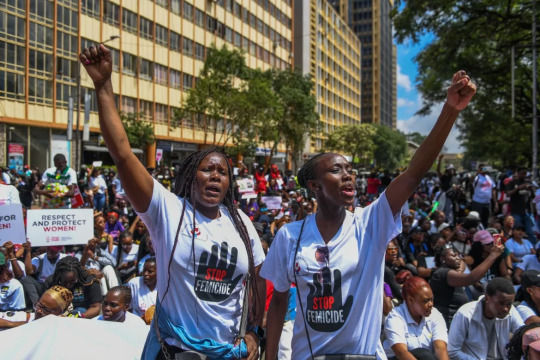
Thousands protest against increasing violence against women in Kenya as they march to the parliamentary building and supreme court in the capital Nairobi [Gerald Anderson/Anadolu Agency]
Published On 27 Jan 202427 Jan 2024
Thousands of people have gathered to protest in cities and towns in Kenya against the recent slayings of more than a dozen women.
The anti-femicide demonstration on Saturday was the largest event ever held in the country against sexual and gender-based violence.
In the capital, Nairobi, protesters wore T-shirts printed with the names of women who became homicide victims this month. The crowd, composed mostly of women, brought traffic to a standstill.
“Stop killing us!” the demonstrators shouted as they waved signs with messages such as “There is no justification to kill women.”
The crowd in Nairobi was hostile to attempts by the parliamentary representative for women, Esther Passaris, to address them. Accusing Passaris of remaining silent during the latest wave of killings, protesters shouted her down with chants of “Where were you?” and “Go home!”
“A country is judged by not how well it treats its rich people, but how well it takes care of the weak and vulnerable,” said Law Society of Kenya President Eric Theuri, who was among the demonstrators.
Kenyan media outlets have reported the slayings of at least 14 women since the start of the year, according to Patricia Andago, a data journalist at media and research firm Odipo Dev who also took part in the march.
Odipo Dev reported this week that news accounts showed at least 500 women were killed in acts of femicide from January 2016 to December 2023. Many more cases go unreported, Andago said.
Two cases that gripped Kenya this month involved two women who were killed at Airbnb accommodations. The second victim was a university student who was dismembered and decapitated after she reportedly was kidnapped for ransom.
Theuri said cases of gender-based violence take too long to be heard in Kenyan court, which he thinks emboldens perpetrators to commit crimes against women.
“As we speak right now, we have a shortage of about 100 judges. We have a shortage of 200 magistrates and adjudicators, and so that means that the wheel of justice grinds slowly as a result of inadequate provisions of resources,” he said.
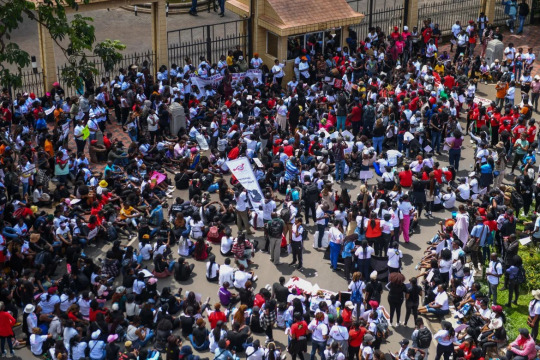
People gather to protest in an anti-femicide demonstration, the largest event of its kind ever held in Kenya. [Gerald Anderson/Anadolu Agency]
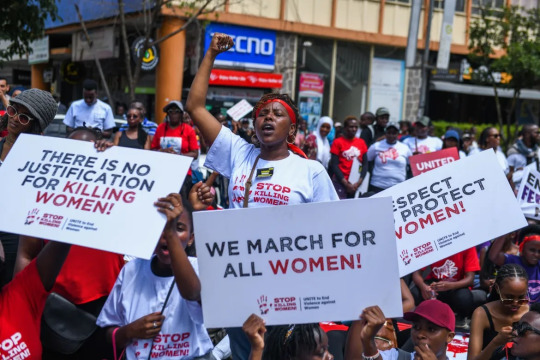
Kenyan media outlets have reported the slayings of at least 14 women since the start of the year. [Gerald Anderson/Anadolu Agency]
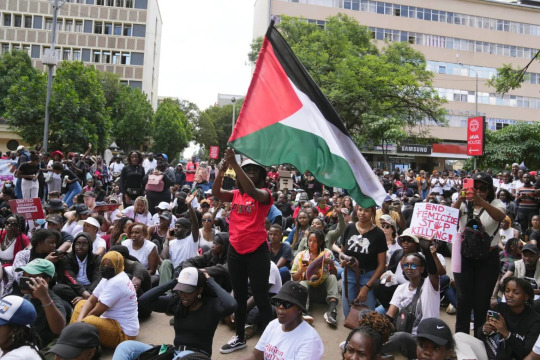
A protester holds a Palestinian flag during a march to protest against the rising cases of femicide, in downtown Nairobi. [Brian Inganga/AP Photo]
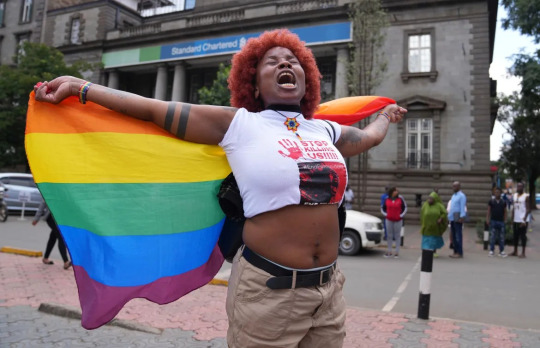
Women and feminists in Kenya took to the streets to march against the rising cases of femicide. [Brian Inganga/AP Photo]

In Nairobi, protesters wore T-shirts printed with the names of women who became homicide victims this month. [Gerald Anderson/Anadolu Agency]
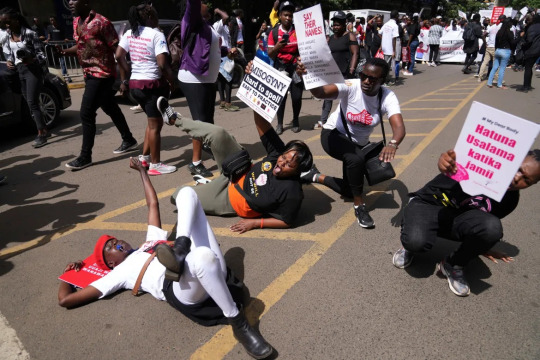
Protesters react against the rising cases of femicide. [Brian Inganga/AP Photo]
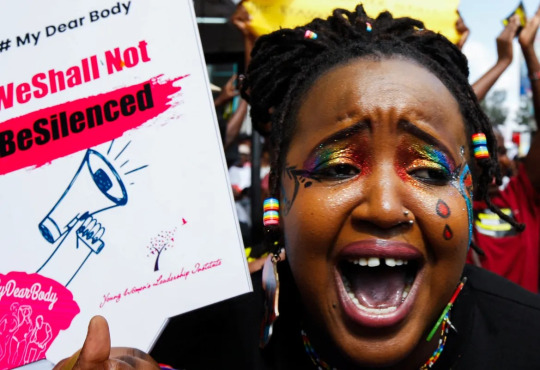
A human rights activist reacts as she attends a protest demanding an end to femicide in the country. [Monicah Mwangi/Reuters]

Protesters gather during the anti-femicide demonstration. [Gerald Anderson/Anadolu Agency]

The crowd, composed mostly of women, brought traffic to a standstill. [Gerald Anderson/Anadolu Agency]
#Kenya#Femicide#Nairobi#There is no justification to kill women#The court systems taking too long to hold perpetrators accountable#The power of women standing together#Please reblog#Western media isn't going to give this the coverage this deserves
1K notes
·
View notes
Text
KenTrade Boost Kenya’s Trade Data Collection with new Business Intelligence Tool
It has been highlighted that big data and economic globalisation are now important factors in trade. Business models that rely on import and export trade are becoming more prevalent. The Business Intelligence (BI) Tool was purchased by Kenya's trade network agency, KenTrade, for Sh90 million in an effort to gather large data on the country's import and export commerce.

#kentrade#kenya'strade#kenya trade data#business intelligence tool#kenya import and export#kenya trade latest#kenyan economy#kenya exim news update
0 notes
Text
Process To Acquire The New digital Number Plate In Kenya
Process To Acquire The New digital Number Plate In Kenya
All car owners in Kenya are eligible to get the new digital number plate which they are going to replace the old ones.
As of now, it is a requirement for all motorists in Kenya to ensure that they are driving on the new digital number plates.
The new digital number plate has new, improved, and digitalized features, such as the new plates now have security features, which allow law enforcement…

View On WordPress
#Car Registration Number Plates#Digital Number Plate#Kd Number Plate Kenya#Kdi Number Plate#Kenya Number Plate Search#Latest Number Plate In Kenya#Latest Number Plate In Kenya 2022#New Digital Number Plate#Number Plates In Kenya#Types Of Number Plate
0 notes
Text
SSC Recruitment: Staff Selection Commission Interpreter Posts..Apply Like This.. | KKG INFO
SSC Recruitment: Staff Selection Commission Interpreter Posts..Apply Like This.. | KKG INFO
SSC Recruitment 2022: Staff Selection Commission (SSC) is going to fill various vacancies in Union Ministries. Ministry of Employees, Public Grievances and Pensions, Government of India…
SSC Recruitment 2022: Staff Selection Commission (SSC) is going to fill various vacancies in Union Ministries. This organization under the Ministry of Personnel, Public Grievances and Pensions, Government of…

View On WordPress
#Commission#INFO#Interpreter#job news#Jobs#KKG#Latest Jobs#latest jobs east rand#latest jobs lahore#latest jobs vacancies in kenya#latest jobs whatsapp group#ministry of defence latest jobs 2021#pakistan latest jobs#Posts..Apply#Recruitment#Selection#SSC#SSC Jobs#SSC Recruitment#SSC Recruitment 2022#staff#This.#Translator jobs#view latest jobs in png
0 notes
Text
Palestinian liberation is a feminist issue. While this truism should need no elaboration, it has, as with so much that relates to Palestine, necessitated discussions, clarifications, analysis and documentation, again and again. Palestine rights activists have long been familiar with the all too common phenomenon known as PEP: Progressive Except for Palestine. Less known, but no less common in feminist circles is FEP, the Feminist Except for Palestine phenomenon. Books such as Evelyn Shakir’s 1997 Bint Arab recount incidents of FEP going back to the ’60s, with many Arab feminists being shunned by their American friends over their support for Palestinian liberation. FEP had one of its early expressions on a global stage at the 1985 United Nations World Conference on Women in Nairobi, Kenya, when Betty Friedan, an icon of second‑wave western feminism, with its slogan ‘the personal is political’, tried to censor the late Egyptian feminist Nawal el‑Saadawi as she was about to walk up to the stage to deliver her address. ‘Please do not bring up Palestine in your speech,’ Friedan told el‑Saadawi. ‘This is a women’s conference, not a political conference.’
Sadly, little has changed in global north feminism’s rejection of the very humanity of the Palestinian people, as evidenced in their continued exclusion from national and global discussions of women’s issues. White feminism has continued to align itself with orientalist imperialist militarism; Ms Magazine cheered the Bush Administration’s US war on Afghanistan in 2001, calling it a ‘coalition of hope’, and suggesting that invasion and occupation could, indeed would, liberate Afghan women. The white feminists in the Feminist Majority Foundation, which bought Ms Magazine in December 2001, never consulted with Afghan feminist organisations such as the Revolutionary Association of the Women of Afghanistan, who denounced both religious fundamentalism and western intervention in Afghanistan, and who opposed the US attacks on their country. More recently, hegemonic feminism’s desire to exempt Israel from criticism led to the fragmentation of the Women’s March, the coalition of women’s and feminist groups that came together to denounce the election of Donald Trump to the presidency of the US. The co‑chair of the 2017 Women’s March was Brooklyn‑born Palestinian American Linda Sarsour, a grassroots organiser who had long championed Palestinian rights. When journalist Emily Shire asked in the New York Times ‘Does Feminism Have Room for Zionists?’, Sarsour responded with a resounding ‘No’. Many felt threatened by her outspokenness and visibility.
Another Palestinian feminist, Mariam Barghouti, also asserted in a 2017 article that ‘No, You Can’t Be a Feminist and a Zionist’, and explained that: ‘When I hear anyone championing Zionism while also identifying as a feminist, my mind turns to images of night raids, to the torture of children and to the bulldozing of homes.’ In the wake of Israel’s latest war on Gaza, white feminists are denouncing the unsubstantiated accusations of sexual violence against Israeli women, without addressing the Israeli state’s amply documented gendered violence against Palestinian women, children, and men. ‘Feminism cannot be selective. Its framework comes from true and absolute liberation not just of women, but of all peoples,’ Barghouti continues, building on bell hooks’ analysis of feminism as a complete liberatory movement. ‘A feminist who is not also anti‑colonial, anti‑racist and in opposition to the various forms of injustice is selectively and oppressively serving the interests of a single segment of the global community.’ Simply, ‘feminism’ that aligns with regimes that engage in racial and ethnic oppression is gendered supremacy; no ideology that hinges on supremacy and discrimination is reconcilable with feminism.
93 notes
·
View notes
Text
Gun Park x Reader: this is our place (we make the rules)
Chapter 2 - Probably should read ch1 first
Gun has a new neighbour. Index: Chapter 1 | Chapter 2 | Chapter 3 | Chapter 4 | Chapter 5 | Chapter 6 | Chapter 7 | Chapter 8 | Chapter 9 | Chapter 10 | Epilogue
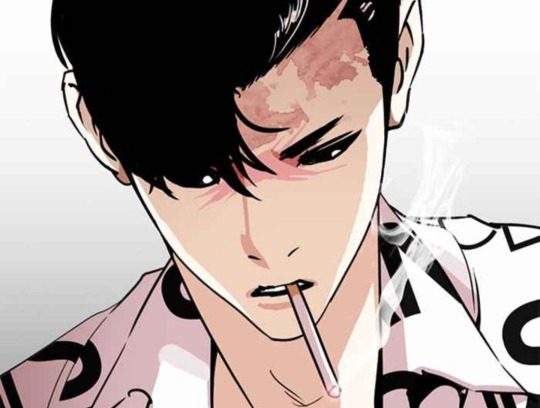
Good manners cost nothing.
Certaining when you barely had a few wons to your name, that was all you could afford. And your pride.
So just because your neighbour essentially said ‘leave me alone, have a nice life’, he still did you a favour.
That you owe him for.
Love thy neighbour and all that.
.
.
Gun Park’s home is not homely by any stretch of the imagination.
All black and white and grey, nearly industrial in taste with wooden accents. Straight lines and sharp edges softened by nature’s hues.
Very few furnishings adorn his apartment, minimal and just shy of clinical. Anything that has a place is the best of the best, luxurious and with an exorbitant price tag to match.
Handcrafted bed from Sweden, which apart from Gun’s, has not experienced the same body twice.
Imported italian coffee machine, used only with beans from Kenya. Drink of choice: 2 shots of espresso, taken as is.
Never-used cooking appliances, still brand new and silver and top of the range.
L-shaped sectional sofa from one of the hottest designers in South Korea, selected and praised by HNH’s own Interior Designer with words that held no interest to Gun.
An obscenely huge bathtub in the corner of a spacious bathroom and facing a breathtaking view. A shower with a rainfall head amongst other sprays and nozzles. Both having washed away a lifetime (and then some)of dirt and grime and blood.
Enough space for a personal home gym in one room (even if the building does include a gym and pool for communal use), and a walk-in wardrobe the size of most other pads in Gangnam.
He’s not much for sentiment, just a couple of more meaningful trinkets here or there. Reminders of Japan and souvenirs from his victims.
Most surprising of all, in a lone forgotten corner, outlined against the impressive, sprawling cityscape and where the best sun spot should be, sits a plant.
Given to him by Goo Kim as a joke for housewarming, “Let’s see how well you can keep something alive”.
Gun’s first urge was to throw it back in his face. Though. The idea of keeping something living intrigued him. A little challenge.
Healthy and vibrant and green with long spiky leaves when it was thrusted into Gun’s hands.
It didn’t hold his attention for long.
Kept alive in the early days by the cleaner, before Gun realised he hated the idea of someone touching his things and being in his space.
Now a sad, neglected eyesore. Shrivelled and brown and hanging on for dear life. Lucky to get a few squirts of water once a month; momentary rejuvenation until it is left to wither again.
And lastly.
Hidden in the cabinet below the huge TV, regularly rotated out for the latest model, lives a few gaming consoles.
...Because Gun is still a young bachelor after all. He isn’t completely immune from the psychological thrills of video games.
.
.
Minimal as it is, and busy as Gun is - it’s still his home.
A sanctuary full of things he has collated and deemed worthy enough to be in his life that he makes sure to regularly return to.
Today, he’s ready for a weekend of nothing. No doubt his leg will bounce and get twitchy after a few hours, but the last few weeks of being on the go with the Four Crews has taken a toll.
Not to mention the hijinks with his neighbour yesterday. Someone that looks like they don’t belong in this district, nevermind in the building.
Yet you knocked on his door.
On Shiro Oni’s door.
Exuding a quiet confidence even as your body betrayed your nerves. Even as two spots of pink appeared on your cheeks once you took in the full view of Gun Park.
Most fascinating of all is that you saw his eyes, treated it as an everyday occurrence, and did not hesitate or flinch.
Huh.
.
.
You ring the doorbell again.
At first, you thought this was an excellent idea.
But now, as you wait (seriously, what is Gun doing in there), you’re feeling more and more foolish.
Tupperwares of homemade kimchi stew, and kimchi sits in the crook of your elbow.
Because when someone has enough money to drown in, and obviously someone living in this building should have, then there’s nothing like a homemade touch.
Here he comes.
The footsteps don’t sound irritable today. Thank the heavens. Maybe antsy, a little too quick footed to be relaxed.
The door is flung open, and your neighbour greets you.
Ok, his footsteps didn’t sound irritable but his face certainly is.
And how does this guy have this effect on you?
Your throat dries up as you notice his hair flopping over one eye, no longer messy after a full day of what must be work, instead likely just leftover from his bedhead.
(Bed. Head. your horrid nasty brain repeats as you think about his BED.)
The linen shirt and pants. Chest bared, pretty collar bones on show and teasing the outline of hard pecs.
Relaxed mode, weekend mode.
Sleeves again rolled up and highlighting the tattoos and faint veins protruding on his forearms.
Seriously, did this guy choose the tattoo placement just to highlight his muscular forearms? Fuck him, it absolutely works.
Gun crosses them, leaning against his open door and observing you. His face, previously not bothering to hide his annoyance at being interrupted by you once again, only shows amusement. Amused to see how hard you are ogling him. It’s not new, though many don’t make it this blatantly obvious.
“Morning,” You hear your voice cracking and clear your throat. “Here.”
You hold out your tupperware boxes.
No hands receive them. They just hang there, in the air between you both.
Gun doesn’t move, continuing to look at you with a hint of a smile and an arched brow.
“It’s thanks. For yesterday.” You give the boxes a little shake. Why the hell can’t this guy just take it.
“No.” is all he gives, retreating back and closing the door.
Your foot darts out, jamming itself into the gap just before it shuts.
“Just take it,” you try to shoulder your way in a little, "it’s for you.”
“I’ve broken people’s necks for less. Move your foot.”
“Just take it,” you repeat again, “then I don’t owe you anything. We’re even.”
Gun considers this.
He didn’t think you owed him anything for yesterday, but you obviously did. It was a quick job in exchange for a peaceful evening, not out of the goodness of his heart.
If this right now is what it takes to get you out of his hair-
“I promise I’ll leave you alone,” comes your voice.
And out of his life forever. Fine.
Gun relents, stepping back as you stagger forward and into his domain.
You hold out the boxes, avoiding his gaze, face bright red at how much of an idiot you feel and what a fuss this has turned out to be.
He finally takes them, once again fingers grazing yours. “Thanks.”
Your eyes meet his as that singular word catches you off balance. You didn’t think it existed in his vocabulary.
“Now get out.”
Ah, that’s more like it.
#lookism#lookism webtoon#lookism x reader#lookism manhwa#lookism fanfic#lookism fics#gun park#park jonggun#gun park x reader#park jonggun x reader#wannaeatramyeon
152 notes
·
View notes
Text
Content warning: Rape, sexual assault, discrimination, homophobia, hate crimes, HIV, STDs.
I’m making this post to raise awareness of the violence and discrimination that has been happening and continues to happen to queer people in the Kakuma camp in northwestern Kenya. Tumblr user transsmith2023 knows the situation well and told me the following,
“The queers are living in a very terrible situation comprised of persecution, torture and discrimination of all sorts that has costed many lives and severe injuries to those who still living.
You can help us through advocating for our equal rights and freedom with the help of both social media platforms, main streams if you have access to them.
You can link us to the queer organisations, personnels so that we can helped.
Private sponsorship program is open, let the queers that side know about our existence. They may be in position to privately sponsor us. Forexample America right know has welcome corps.”
He goes on to say, “Because of our orientation, we are refused jobs, limiting our access to necessary resources. Many of us are homeless and sleep outside, leaving us increasingly vulnerable to violence. We cannot afford food and water, living in poverty even more extreme than the camp’s general population . Many victims of rape and sexual violence contract HIV and other STDs, but cannot afford the medicine which could save their lives.
Our story has been platformed by major NGOs, including Amnesty- https://www.amnesty.org/en/latest/news/2023/05/kenyas-kakuma-refugee-camp-not-yet-safe-for-lgbti-asylum-seekers/ ,
https://www.thepinknews.com/2023/06/07/kakuma-refugee-camp-trans-lgbtq-amnesty/ , https://theconversation.com/amp/lgbti-refugees-seeking-protection-in-kenya-struggle-to-survive-in-a-hostile-environment-182810.
Despite this attention, we face no material aid and no protection from the violence which haunts us daily.”
As a queer person I side with all the queer people who are in Kakuma and I hope this post does something to help.
56 notes
·
View notes
Text
Kenya Launches National Tree Planting Day: A Step Towards Combatting Climate Change
https://headlinehorizon.com/World/Environment/1136
Discover the latest news from Kenya as the government announces a surprise public holiday dedicated to planting trees. With an ambitious goal of planting 15 billion trees by 2032, Kenya aims to combat climate change and increase its forest cover. Find out more about this monumental initiative and its significance in the fight against global warming.
0 notes
Text
Haiti's government declared a 72-hour state of emergency on Sunday after armed gangs stormed a major prison. At least 12 people were killed and about 3,700 inmates escaped in the jailbreak.
Gang leaders are demanding the resignation of Prime Minister Ariel Henry, whose whereabouts are unknown since he travelled to Kenya.
Gangs control around 80% of the capital, Port-au-Prince.
Gang violence has plagued Haiti for years.
A government statement said two prisons - one in Port-au-Prince and the other in nearby Croix des Bouquets - were stormed over the weekend.
It said the acts of "disobedience" were a threat to national security and said it was instituting an immediate night-time curfew in response, which started at 20:00 local time (01:00 GMT on Monday).
How gangs came to dominate Haiti
Haitian media reported that police stations were attacked, distracting authorities before the coordinated assault on the jails.
Among those detained in Port-au-Prince were suspects charged in connection with the 2021 killing of President Jovenel Moïse.
In the capital, gangs have erected barricades to prevent security forces from encroaching on their territory, while their strongholds in Port-au-Prince's vast shantytowns are still largely on lockdown.
Schools and many businesses are closed, and there are reports of looting in some neighbourhoods.
Police have set up roadblocks and there is much uncertainty on the streets.
The latest upsurge in violence began on Thursday, when the prime minister travelled to Nairobi to discuss sending a Kenya-led multinational security force to Haiti.
Gang leader Jimmy Chérizier (nicknamed Barbecue) declared a co-ordinated attack to remove him.
"All of us, the armed groups in the provincial towns and the armed groups in the capital, are united," said the former police officer, who is accused of being behind several massacres in Port-au-Prince.
Haiti's police union had asked the military to help reinforce the capital's main prison, but the compound was stormed late on Saturday.
On Sunday the doors of the prison were still open and there were no signs of officers, Reuters news agency reported. Three inmates who tried to flee lay dead in the courtyard, the report said.
A journalist for the AFP news agency who visited the prison saw around 10 bodies, some with signs of injuries caused by bullets.
One volunteer prison worker told the Reuters news agency that 99 prisoners - including former Colombian soldiers jailed over President Moïse's murder - had chosen to remain in their cells for fear of being killed in crossfire.
They have now been transferred to a different prison.
The US embassy in Port-au-Prince on Sunday urged its citizens to leave Haiti "as soon as possible". The French embassy said it was closing visa services as a "precaution".
While Haiti has been plagued by gangs for years, the violence has further escalated since President Moïse's assassination at his home in 2021. He has not been replaced and presidential elections have not been held since 2016.
Under a political deal, Mr Henry was due to stand down by 7 February. But planned elections were not held and he remains in post.
A spokesperson for the White House's National Security Council said it was "monitoring the rapidly deteriorating security situation" with "grave concern".
They said the path forward "lies with free and fair elections" and violence serves "only to delay a democratic transition while... upending the lives of thousands".
Speaking to the BBC's Newsday, Claude Joseph - who was serving as acting prime minister when President Moïse was assassinated and who is now head of the opposition party called Those Committed to Development - said Haiti was living through a "nightmare".
Mr Joseph said Prime Minister Henry wanted "to stay as long as possible in charge".
"He agreed to step down on 7 February. Now he decides to stay, despite the fact that there are huge protests throughout the country asking him to step down - but it's unfortunate that now those criminals are using violent means to force him to step down."
In January, the UN said more than 8,400 people were victims of Haiti's gang violence last year, including killings, injuries and kidnappings - more than double the numbers seen in 2022.
Many health facilities have stopped operating because of the bloodshed.
Anger at the shocking levels of violence, on top of the political vacuum, have led to several demonstrations against the government, with protesters demanding the resignation of the prime minister.
18 notes
·
View notes
Text
It was never “women were trading sex for fish” it was “men were exploiting hungry women with hungry children”.
At least there is a happy ending to this story.

When an NPR team met Justine Adhiambo Obura in the fall of 2019, she wore a turquoise t-shirt with a bold message: "No Sex for Fish."
It wasn't just an eye-catching slogan. It was a summation of the indignities women faced in her world — and how they flipped the power dynamic.
In a number of lakeside communities in Africa and other parts of the world, men do the fishing and women sell the fish. For many of the women, living in poverty and with minimal education and a lack of job opportunities, there was no other way to earn a living, to support their children.
As supplies of fish diminished in various locations, fishermen began demanding sex in exchange for providing a woman with fish to sell. That was the case in Nduru Beach on Lake Victoria, where Obura lives. A lot of the fishermen were HIV positive and infected the women. The women hated this practice of transactional sex but many felt they had no choice. "I exchange sex; I get fish," Mika Onyango, a mother of six, told us. "I don't care about getting HIV. Me, I need fish. I need earning to sustain my family."
In 2011 Obura and others came up with a game-changing idea. What if they owned their own boats – and hired men to fish for them? With the help of a couple of Peace Corps volunteers and a series of grants, they started the No Sex for Fish
cooperative. Eventually, Nduru Beach and eight other area villages got boats – around 30 in total. The women of Nduru Beach not only earned a living but built up a sizeable rainy day fund – some $6,000 – which they donated or loaned to members facing financial stress.
Then came an unprecedented series of rainy days. In early 2020, Lake Victoria rose and flooded Nduru Beach. The 1,000 or so residents fled to safety. They abandoned their homes; many of them had no alternative but to live in improvised shelters at local schools. They had no personal savings – and for the women of No Sex for Fish, no way to make money. These women – some of them single mothers, some of them HIV positive – saw most of their boats lost or damaged beyond repair. The money the group had saved over the years enabled them to weather these dire times.
Some former fishmongers turned to farming. In nearby Kusa Beach, which had a chapter of No Sex for Fish, a tomato project looks promising. Obura and some of the women of Nduru Beach tried agriculture too. It didn't work out for them.
Eventually the waters of the Lake receded and the Nduru Beach women came up with a plan that seemed risky but made sense to them: Let's go back to fishing.
Here's the story of the unexpected revival of No Sex for Fish.
A tall woman walks around a boat as a carpenter slowly seals its sides to block water from seeping in. She is Justine Adhiambo Obura, a founding member of the No Sex for Fish cooperative.
The carpenter is putting the final touches on the boat, which was built with Ugandan hardwood to give it a long life as a fishing vessel on Lake Victoria.
"We are slowly getting our lives and source of livelihoods back," says Obura. "Through our efforts in our group No Sex for Fish, our members are slowly getting back to business."
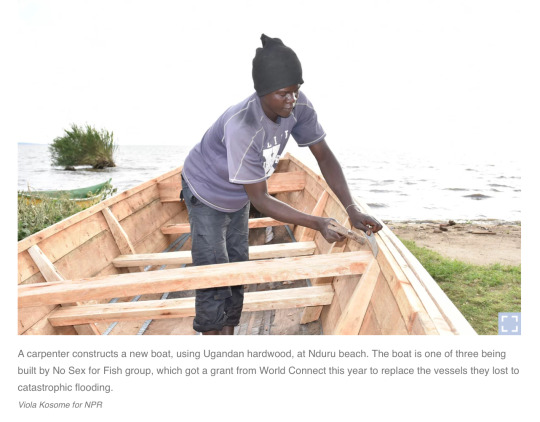
An 'amazing' turn of events
The fact that this boat is being built for the No Sex for Fish group is "surprising," says Tim Kibet of Kenya, a field agent for the charity World Connect. That's the group that funded earlier boats and this summer issued a grant for approximately $8,000 U.S. to build three new boats and buy the voluminous nets needed for fishing.

A year ago, in the wake of the catastrophic flooding, the No Sex for Fish group seemed to have reached an end, he recalls. "Their boats were destroyed, the women were so devastated they didn't know what to do. I'm glad they held onto themselves as a group."
Patrick Higdon of World Connect's London office, who has monitored the grants given to No Sex for Fish, is equally surprised: "It was pretty bleak last year. To see this [fishing] kick back up, we always knew they wanted it and had the perseverance. But it just didn't seem like the conditions were going to allow it."
"They were adamant all along that they needed to get back to fishing," Higdon says. "At the time with the flooding and the homes damaged and all that we had read about the fishing economy and dwindling catch, it was hard to believe — but they were insistent. It's what they know and what they know can be profitable.

Pondering the unlikely turn of events, Higdon says: "It's pretty amazing, it's pretty cool."
Back to the beach
Ten women are part of the revived No Sex for Fish cooperative. They all used to live in Nduru Beach but were displaced by the flooding. The waters have receded. A few people have returned to the village, including the group's treasurer and one other member.
One boat has been completed using the new grant money and is already fishing the lake. The women had salvaged two engines from their previous boats and are using one on this new craft. Fishermen take the vessel out for the night. In the morning, a couple of women from the No Sex for Fish group meet the boat. They take turns because most of them now live outside Nduru Beach and may have to walk for 30 minutes or take a motorcycle taxi to the shore.

On a recent morning in August, two women were cleaning the newly caught fish – Nile perch, catfish, tilapia, tiny silvery fish called omena. They'll sell most of the daily catch but also take fish home to feed their families. The women say they make about $10 a day.
The income helps support their families, with a portion devoted to rebuilding their nest egg for future needs. Since the women resumed fishing in July, they have saved up around $600 — roughly an average monthly salary in Kenya.
The hope is that some of these savings will eventually help flood-displaced members find permanent housing.
There's another ambitious goal: building more boats so their enterprise and income will grow.
Persisting and planning
Of course the lake could rise again. So the group needs a plan to ensure that their new boats survive any future disaster.
They're definitely going low-tech in their solutions. One plan is to nestle the boats in wild papyrus plants when not in use. The towering plants could prevent a boat from being washed away in a flood.
On top of the flooding crisis, the women have faced personal tragedies. Rose Atieno Abongo is grieving the loss of her 26-year-old son, whose body she found outside her home about a month ago. She suspects he was killed by robbers and now must raise her 5 remaining kids without the income he earned as a fisherman.
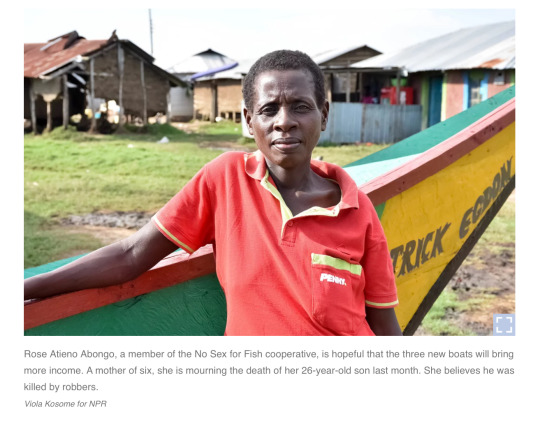
"I used all the money I had for my son's burial and I do not have even small amount of money to continue with my business of selling fish," says Abongo.
But she is still hopeful that life will change for the better. She decided to be part of the No Sex for Fish revival so she can put food on the table for her kids.

Another member, Lorine Otieno Abuto, who is HIV positive, says, "I am just praying that I will get some money to make my own boat like I had before." She dreams of the life she had before, when she was still poor but "I would sell fish from my boat and at least life was not that hard."
Her remark is a reminder that these women lead tough lives — yet somehow found the strength to take charge of their destiny, back in 2011 and now again in 2022.
And for Justine Adhiambo Obura, a mother of 9, including a daughter with development disabilities, the three new boats are a cause for joy in the wake of the fearsome floods. "We feel so good," she says. "We are very happy."
Viola Kosome is a freelance journalist in Kenya.
#No Sex for Fish#Men exploiting women#lake victoria#World Connect#Women and food security#Women impacted by natural disasters#Nduru beach#Kenya
264 notes
·
View notes
Text

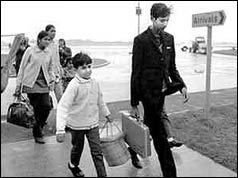
On 18th September 1972, BBC News reported that the first 193 Ugandan refugees, fleeing persecution by the country’s military dictatorship, had arrived at Stansted Airport, Essex. Over half of the arrivals had British passports, and housing and immediate needs would be overseen by the Ugandan Resettlement Board.
Uganda’s Asian community, numbering around 55 000, many of whom ran family businesses and small enterprise, were ordered in August 1972 to leave the country within 90 days by President Idi Amin. Amin had publicly denounced Ugandan Asians as ‘bloodsuckers’, threatening that any who had not left by the arbitrary deadline of November 8th would be interned in military detention camps.
Many of the initial flight of refugees had endured frightening experiences prior to their departure from Uganda, at the hands of Amin’s troops. "On the way to the airport the coach was stopped by troops seven times, and we were all held at gun point," one refugee told reporters. Another stated that he had been robbed of personal valuables and Ugandan currency on the way to Entebbe airport.
News reports at the time cited some opposition within the UK over the acceptance of the Ugandan Asians. The Leicester local authority mounted a newspaper campaign urging refugees not to come to their region seeking jobs and housing. The BBC asserted that, in hindsight, the resettlement programme was seen as ‘a success story for British Immigration’.
The loss of the hardworking and successful Ugandan Asian community devastated Uganda’s agriculture, manufacturing and commerce. Idi Amin was deposed in 1979 and died in Jeddah in 2003, having been responsible for the deaths of as many as 300 000 Ugandan civilians during his reign of terror as President. In 1991, Ugandan President Yoweri Museveni invited the expelled community to return home to help rebuild the economy.
The Wilson Labour government also had to grapple with a refugee crisis from a former African colony.
In February 1968, BBC news reported;
"…Another 96 Indians and Pakistanis from Kenya have arrived in Britain, the latest in a growing exodus of Kenyan Asians fleeing from laws which prevent them making a living…"
Many Asian people living in Kenya had not taken up Kenyan citizenship following the country’s independence from Britain in 1963, but possessed British passports. Under Kenya’s Africanisation policy, non-citizens required work permits, and were being removed from employment in favour of Kenyan nationals. There was growing public demand for laws to prevent non-citizens from owning businesses or even operating as street and market traders. As a result, British passport holders were leaving Kenya at the rate of 1000 per month, leaving a huge deficit in skills and experience within the business community and civil service.
Fearing a backlash over the large numbers of Asian immigrants, Home Secretary, and future Prime Minister, James Callaghan, rushed through the Commonwealth Immigration Act, which made it a requirement that prospective immigrants must have a 'close connection' with Britain.

This led to disagreement in Cabinet, with Secretary of State for Commonwealth Affairs, George Thomson (1921-2008) arguing;
"…To pass such legislation would be wrong in principle, clearly discrimination on the grounds of colour, and contrary to everything we stand for…"
In 1971, the Heath government made further legislative changes that would mean that (some) immigrants from Commonwealth countries would be treated no more favourably than those from the rest of the world, and that tightened restrictions on those who stayed by linking work permits to a specific job and location, requiring registration with police, and reapplication to stay in Britain each 12 months.
The Patrial Right of Abode lifted all restrictions on those immigrants with a direct ancestral connection with Britain.

Home Secretary Reginald Maudling (later famous for being smacked in the face by Irish MP Bernadette Devlin, and for having to resign over a corruption scandal linked with disgraced property developer John Poulson) denied that this was, in effect, a 'colour bar', telling the BBC;
"…Of course they are more likely to be white because we have on the whole more whites than coloureds in this country, but there is no colour bar involved…"
Unsurprisingly, not everyone was convinced.
Vishna Sharma, Executive Secretary of the Joint Council for the Welfare of Immigrants, described the bill to BBC News as, "basically racially discriminatory, repressive and divisive," and added, "It will create divisions amongst the Commonwealth citizens already living in this country on patrial and non-patrial basis. It will create day-to-day bureaucracy and interference on people living in this country. It will create more hardship for people wanting to enter into this country."

(Source; BBC reporting and history.com. Photo Credits; BBC News)
#social history#uk politics#working class history#social justice#uk government#human rights#uk history#british culture#society#history#race relations#immigration
26 notes
·
View notes
Text


The spotless giraffe, born at a Tennessee zoo, is the first one seen in more than 50 years.
By Dina Fine Maron
24 August 2023
Just a few weeks old and still without a name, a newborn giraffe at a zoo in northeastern Tennessee could rightly be nicknamed “spotless.”
The female giraffe born without its characteristic spots instead boasts a solid brown coat, a phenomenon that hasn’t been observed in any giraffe for more than 50 years.
She was born last month at Brights Zoo, a family-owned facility in Limestone, Tennessee.
A spotless giraffe was last reported at a Tokyo zoo in 1972.
“The spotless giraffe calf is certainly an interesting case and that type of coloring has never been seen in the wild," says Sara Ferguson, a wildlife veterinarian and conservation health coordinator at the Giraffe Conservation Foundation.
The animal’s rare coloring is likely due to some sort of mutation in one or more genes, she says.
But there’s no indication of underlying medical issues or that the newborn reticulated giraffe — a subspecies native to eastern Africa — is at a genetic disadvantage.
David Bright, zoo director at the Brights Zoo, says that the baby’s nine-year-old mother, Shenna, had previously birthed three other calves and the trio were all spotted.
This latest addition to the zoo’s giraffe family was born at a weight of around 190 pounds, he says, and her veterinary care team concluded “she’s healthy and normal” — though her coloring was a surprise.
A case of spotlessness
Genetics often influence animal coloring in diverse ways.
Giraffes with all white coloring have previously been spotted in the wild, including two at a reserve in Kenya in 2017.
Those animals had a genetic condition called leucism, which blocks skin cells from producing pigments.
"There’s no known explanation for the spotless giraffe in Tennessee beyond that it’s almost certainly due to some kind of genetic mutation or mutations," says Fred Bercovitch, a wildlife conservation biologist at the Anne Innis Dagg Foundation, a nonprofit that focuses on giraffe conservation.
The last known case of a spotless giraffe was an animal named Toshiko born in 1972 at Ueno Zoo in Tokyo, Japan, CBS News reported.
That giraffe’s mother had birthed another spotless calf several years earlier, according to Bright.
The Brights Zoo, which is home to just over 700 animals of 126 different species, including nine giraffes, asked the public to vote on four potential names for the giraffe calf on its Facebook page.
It accrued over 17,000 votes in the first day, Bright says.
There are four candidate names, all in Swahili: Kipekee (unique), Firyali (extraordinary or unusual), Shakiri (she is most beautiful), and Jamelia (one of great beauty).
What’s in a spot?
A 2018 study published in the journal PeerJ found that certain aspects of giraffe spots are passed down from mother to calf, such as how round the spots are and their smoothness (which is technically referred to as “tortuousness”).
The study authors also noted that bigger, rounder spots seemed linked to higher survival rates for young giraffes.
Still unanswered, however, was if that was possibly due to better camouflage or other unknown factors like enhanced ability to regulate temperature.
Bercovitch, who wasn’t involved in that study, says he wouldn’t be concerned about the spotless giraffe’s health even if the giraffe was born in the wild and away from a zoo’s medical care.
“Among mammals, the fur and the hair are the primary features that assist in thermoregulation, not the color of the fur,” he says.
“Giraffes can regularly raise their body temperature by a few degrees … they don’t sweat,” he says.
“That’s one of the reasons you find giraffes under trees—they want to keep their body temperatures within certain limits.”
Even the lack of camouflage wouldn’t necessarily mean the giraffe would be at a disadvantage in the wild, he says, since the mortality rate for young giraffes from lion predation is already so high.
Ferguson, the wildlife veterinarian says she looks forward to hearing more about the giraffe in the years to come.
“What would be cool,” she says, “would be to take an infrared light photo or a thermograph of her to see if the spot pattern is still there but invisible to our eye.”

🤎🦒🤎
#giraffe#Brights Zoo#Sara Ferguson#Giraffe Conservation Foundation#reticulated giraffe#Shenna#leucism#spotless giraffe#Fred Bercovitch#David Bright#Anne Innis Dagg Foundation#Toshiko#Ueno Zoo#Tokyo#PeerJ#wildlife#animals#zoo#Nat Geo#National Geographic
6 notes
·
View notes